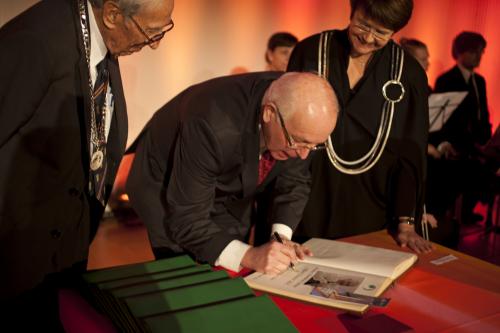
Philip Cohen receives the Albert Einstein World Award of Science in Helsinki on 17 November 2014
Philip Cohen received the 2014 Albert Einstein World Award of Science from the World Cultural Council at a ceremony at Aalto University Finland on 17 November 2014. The award was made by the World Cultural Council's Interdisciplinary Committee including eminent scientists from all five continents.
The prize, which consists of a diploma, and commemorative medal and cheque for ten thousand US dollars, has been awarded for 'his 40-year outstanding and continuing scientific career devoted to studying and establishing the profound importance of protein phosphorylation in regulating almost every physiological process. Professor Cohen's achievements meet the criteria for the Albert Einstein World Award of Science most closely in respect to bringing "true benefit and well-being to mankind" in their importance to the development of drugs and treatment with global impact. Professor Cohen's pivotal contribution has been to elucidate a major section of the insulin signal transduction-signalling pathway, essentially from scratch, starting at a time when virtually nothing was known about cell signalling. This was to be based on his dissection of protein kinase dependent cascades, which are the major intracellular components of hormonal signalling networks. His research has raised Dundee University to one of the leading academic institutions in his field of this study. Professor Cohen has made decisive contributions to the growth and international reputation of life sciences at the university and to the development of a life sciences cluster in the city, which now accounts for 16% of its economy. In fact, the College of Life Sciences has, for several years, been voted one of the best scientific environments in the world in which to work. Throughout his career Philip Cohen has been an exceptional mentor of talented young researchers. More than one hundred PhD students and postdoctoral scientists have trained in his laboratory over thirty-eight years, with the vast majority now working in senior roles as academic research leaders.'
To read the full citation click here.
The prize, which consists of a diploma, and commemorative medal and cheque for ten thousand US dollars, has been awarded for 'his 40-year outstanding and continuing scientific career devoted to studying and establishing the profound importance of protein phosphorylation in regulating almost every physiological process. Professor Cohen's achievements meet the criteria for the Albert Einstein World Award of Science most closely in respect to bringing "true benefit and well-being to mankind" in their importance to the development of drugs and treatment with global impact. Professor Cohen's pivotal contribution has been to elucidate a major section of the insulin signal transduction-signalling pathway, essentially from scratch, starting at a time when virtually nothing was known about cell signalling. This was to be based on his dissection of protein kinase dependent cascades, which are the major intracellular components of hormonal signalling networks. His research has raised Dundee University to one of the leading academic institutions in his field of this study. Professor Cohen has made decisive contributions to the growth and international reputation of life sciences at the university and to the development of a life sciences cluster in the city, which now accounts for 16% of its economy. In fact, the College of Life Sciences has, for several years, been voted one of the best scientific environments in the world in which to work. Throughout his career Philip Cohen has been an exceptional mentor of talented young researchers. More than one hundred PhD students and postdoctoral scientists have trained in his laboratory over thirty-eight years, with the vast majority now working in senior roles as academic research leaders.'
To read the full citation click here.

